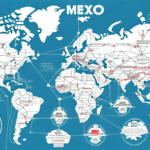Choosing the Right Shipping Carrier for Your Business
When it comes to delivering your business products, selecting the right shipping carrier is crucial. Two of the most prominent shipping carriers in the US are UPS and FedEx, both offering a variety of shipping solutions tailored for businesses of all sizes. This comprehensive comparison delves into the different aspects of UPS and FedEx shipping rates, empowering you to make an informed decision for your business.
Introduction to UPS and FedEx
UPS and FedEx are the leading shipping carriers in the United States, providing extensive shipping solutions for businesses globally. Both companies offer a wide array of services, including ground shipping, air shipping, international shipping, and express delivery. As of 2023, UPS delivers approximately 24 million packages and documents daily, while FedEx handles around 14 million shipments each day (Statista).
One of the key distinctions between UPS and FedEx lies in their pricing structures. UPS typically charges based on the weight and distance of the package, whereas FedEx offers various pricing options, including flat-rate shipping and volume discounts. Additionally, UPS boasts a more extensive global network, operating in over 220 countries and territories, compared to FedEx's presence in approximately 220 countries and territories. When choosing between the two carriers, it's essential to evaluate factors such as pricing, delivery speed, and global reach to determine the best fit for your business needs.
Understanding Shipping Rates
Shipping rates are dynamic and can fluctuate based on several factors. Accurately calculating shipping costs is vital for maintaining your business's profitability. Both UPS and FedEx assess the package's weight, destination, dimensions, and desired speed of delivery when determining shipping rates. Accurate information is crucial, as miscalculations can significantly impact your bottom line.
Moreover, the type of shipping service selected plays a pivotal role in cost determination. For instance, opting for expedited shipping ensures swift delivery but comes at a higher price point compared to standard shipping. Additional fees, such as insurance or signature confirmation, can further increase the overall shipping cost. By comprehensively understanding these factors, businesses can make strategic shipping decisions that balance efficiency and cost-effectiveness.
Factors That Affect Shipping Rates
Package Weight and Dimensions
The weight and size of a package are primary determinants of shipping rates. Heavier and larger packages incur higher shipping costs due to the increased resources required for transportation.
Destination
The destination of the shipment significantly influences shipping rates. International shipments typically cost more than domestic ones due to additional handling, customs clearance, and longer transit distances.
Service Type
The chosen service type, such as express or standard delivery, directly impacts the cost. Expedited services offer faster delivery times but come at a premium.
Additional Fees
- Fuel Surcharges: Fluctuations in fuel prices can lead to variable surcharges.
- Special Handling Fees: Items requiring special handling, such as fragile or hazardous materials, may incur extra charges.
- Peak-Season Surcharges: High-demand periods, like holidays, can result in increased shipping rates.
Origin of Shipment
Shipping from remote or rural locations may attract additional fees due to limited carrier infrastructure in these areas. Similarly, international shipments may involve customs fees and taxes, further elevating costs.
How UPS Determines Shipping Rates
UPS employs a zone-based pricing system that calculates shipping costs based on the package's weight, size, and destination. The farther the package travels, the higher the shipping cost. UPS also considers the type of delivery service selected, such as ground, air, or freight.
Another critical factor is the package's dimensional weight, calculated by multiplying the length, width, and height of the package and dividing by a dimensional factor. This means that even lightweight packages can incur higher rates if they occupy substantial space in the delivery vehicle.
For businesses with high shipping volumes, UPS offers special pricing and discounts, making it a cost-effective option for large-scale operations.
How FedEx Determines Shipping Rates
FedEx calculates shipping rates based on the shipment's weight, dimensions, and destination. In addition to these factors, FedEx offers various services, including insurance, tracking, international shipping, and express delivery options. Similar to UPS, FedEx provides discounts for businesses with substantial shipping volumes.
FedEx's pricing structure also accounts for the type of delivery service selected. Options like same-day, next-day, and two-day deliveries come with varying rates, allowing businesses to choose the service that best fits their urgency and budget.
Furthermore, FedEx offers specialized solutions tailored to specific industries, such as healthcare and e-commerce. These customized services, like temperature-controlled shipping for medical supplies or specialized packaging for online retailers, enhance efficiency and cost-effectiveness.
Comparing Shipping Options: Domestic vs. International
Domestic Shipping Rates Comparison: UPS vs FedEx
When comparing domestic shipping rates, several factors come into play, including package weight, size, destination, and delivery speed. Both UPS and FedEx offer flat-rate pricing options for businesses with high shipping volumes. Generally, UPS is slightly more cost-effective for smaller packages, whereas FedEx offers better rates for larger and heavier shipments (Forbes).
Delivery options also vary between carriers. UPS provides a wider range of delivery services, including same-day, next-day, and two-day delivery, while FedEx emphasizes overnight and two-day delivery. Depending on your business requirements, one carrier may offer services that better align with your needs.
Both carriers offer additional services such as insurance, tracking, and signature confirmation for an extra fee. It's important to factor these costs into your overall shipping budget when making a comparison.
International Shipping Rates Comparison: UPS vs FedEx
For international shipments, both UPS and FedEx provide comprehensive shipping options. Key considerations include destination country, delivery speed, and associated customs procedures. UPS is often regarded as more cost-effective for international shipping, while FedEx is known for its faster delivery times (Investopedia).
UPS typically bases its international rates on package weight and destination, whereas FedEx incorporates package dimensions into its pricing. Consequently, larger packages may result in higher costs with FedEx compared to UPS for the same route and delivery speed.
Both carriers offer customs clearance services, insurance, and comprehensive tracking options, ensuring that businesses can manage their international shipments efficiently.
Ground Shipping Comparison: UPS vs FedEx
Ground shipping is a popular choice for businesses due to its balance between cost and delivery speed. When comparing UPS and FedEx ground shipping rates, factors such as destination, package weight, and dimensions are paramount.
UPS ground shipping is generally more affordable, especially for packages weighing less and traveling shorter distances. However, FedEx ground is recognized for its faster delivery times and more reliable service in certain regions.
The delivery networks of both carriers differ, with UPS covering more zip codes and rural areas, providing an advantage for businesses shipping to remote locations. FedEx, on the other hand, offers flexible delivery options like evening and weekend deliveries, catering to businesses that need to meet specific customer schedules.
Additionally, FedEx has a reputation for superior customer service, offering dedicated support teams to assist with any shipping-related issues.
Air Shipping Comparison: UPS vs FedEx
Air shipping is ideal for businesses requiring fast and reliable delivery of time-sensitive packages. Both UPS and FedEx offer a range of express delivery options catering to different needs.
When comparing air shipping rates, it's essential to consider factors such as destination, package size and weight, and desired delivery speed. Generally, UPS air shipping tends to be more economical for smaller packages, while FedEx offers competitive rates for larger shipments.
Both carriers provide additional services like package tracking, insurance, and signature confirmation. UPS's My Choice service allows customers to customize delivery preferences and receive real-time alerts, whereas FedEx's Delivery Manager offers similar functionalities, ensuring enhanced visibility and control over shipments.
Express Shipping Comparison: UPS vs FedEx
Express shipping services ensure prompt delivery, essential for businesses needing to meet tight deadlines. Both UPS and FedEx offer next-day, two-day, and three-day express delivery options.
In terms of express shipping rates, UPS generally provides more cost-effective solutions for smaller packages, while FedEx may be more affordable for larger packages. It's crucial to evaluate the specific requirements of your shipments to choose the most economical option without compromising on delivery speed.
Both carriers' express services include robust tracking systems, insurance, and delivery confirmation, providing businesses with the assurance that their packages will arrive on time and in good condition.
Delivery Time Comparison: UPS vs FedEx
Delivery speed is a critical factor in selecting a shipping carrier. Both UPS and FedEx are renowned for their reliable and fast delivery options.
UPS typically offers slightly faster delivery times compared to FedEx, especially for domestic shipments. However, the difference is marginal and may vary based on the specific route and service selected.
For international shipments, FedEx often outpaces UPS in terms of delivery speed, making it a preferred choice for businesses that require swift international logistics.
Tracking and Visibility Comparison: UPS vs FedEx
Tracking and visibility are essential for businesses to monitor their shipments and provide customers with real-time updates. Both UPS and FedEx offer comprehensive tracking tools that allow businesses to track shipments online.
UPS's tracking system is generally considered more robust, offering detailed information on package locations and delivery statuses. Additionally, UPS provides tracking updates via email and SMS, enhancing visibility throughout the shipping process.
FedEx's tracking system is equally efficient, offering real-time updates and customizable notifications through its FedEx Delivery Manager. Both carriers ensure that businesses can maintain transparency and promptly address any delivery issues.
Customer Service Comparison: UPS vs FedEx
Exceptional customer service is vital for resolving shipping issues and maintaining business relationships. Both UPS and FedEx offer multiple channels to reach their customer service teams, including phone, email, and live chat.
UPS is often praised for its outstanding personalized services, providing dedicated support to businesses and ensuring prompt resolution of any shipping-related problems. This level of customer care makes UPS a preferred choice for many businesses seeking reliable support.
FedEx also offers comprehensive customer service, with a focus on efficiency and responsiveness. While both carriers provide excellent support, the preference may depend on the specific needs and experiences of the business.
Which Carrier is Better for Your Business?
Ultimately, the decision between UPS and FedEx hinges on your business's specific shipping needs. Consider the following factors to determine the best fit:
- Package Size and Weight: UPS is generally more cost-effective for smaller packages, while FedEx offers better rates for larger shipments.
- Delivery Times: If speed is a priority, FedEx may offer faster international delivery, whereas UPS provides competitive domestic delivery speeds.
- Shipping Destination: UPS has a more extensive global network, which may benefit businesses with international shipping requirements.
- Service Flexibility: FedEx's flexible delivery options, like evening and weekend deliveries, can be advantageous for businesses needing adaptable shipping schedules.
- Customer Support: Evaluate the quality of customer service provided by each carrier to ensure reliable support when needed.
Both UPS and FedEx offer reliable and cost-effective shipping options. By carefully assessing your business's unique requirements, you can choose the carrier that best aligns with your operational goals and customer satisfaction standards.
Conclusion: Final Thoughts on Comparing Business Shipping Rates
UPS and FedEx are two of the most reputable shipping carriers for businesses, each offering a suite of services designed to meet various shipping needs. When comparing their shipping rates, it's essential to consider factors such as package weight, size, destination, and additional service requirements like insurance and tracking.
Ultimately, the right carrier for your business depends on your specific shipping needs and operational priorities. By thoroughly evaluating the strengths and offerings of both UPS and FedEx, you can make an informed decision that enhances your shipping efficiency, reduces costs, and ensures timely delivery of your products to customers.


















